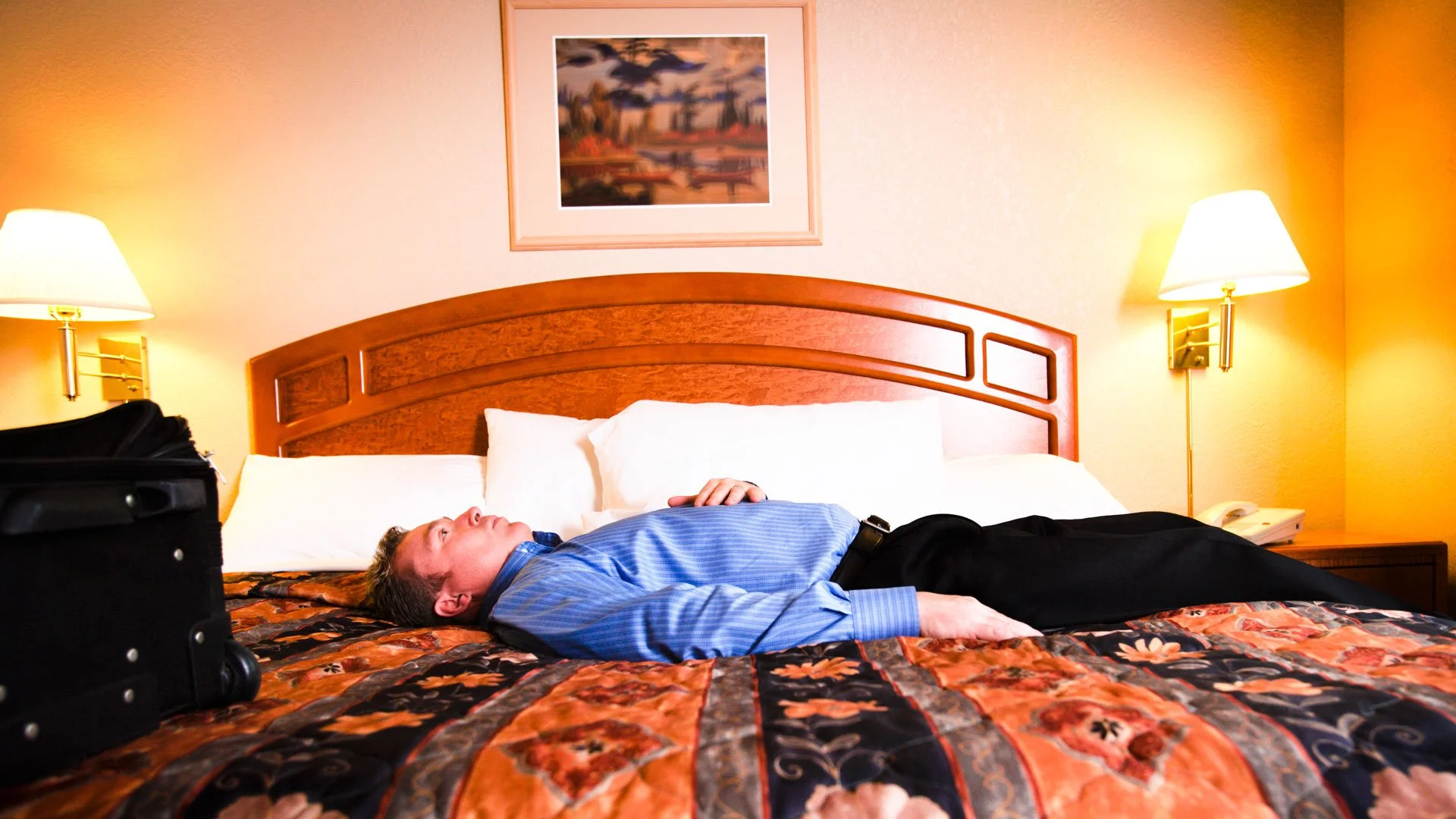Jet lag prevention guide: flights, hydration, caffeine & smart naps
Jet lag is a temporary sleep problem that can affect anyone who quickly travels across multiple time zones. Your body’s internal clock, or circadian rhythms, is out of whack as a result, signaling your body to stay awake when it is time to sleep and sleep when it is time to be up and about. But there are ways to cope and avoid jet lag.
Jet lag is nearly inevitable, really, when you travel at today’s pace across multiple time zones. Man was meant to saunter thousands of miles, not jet between continents to find himself propelled into tomorrow or reliving this morning suddenly.
Avoiding jet lag is really all about minimizing its effects. That indeed is possible, but some of what you need to do may seem counterintuitive.
Know what jet lag is to start avoiding it
This is not some weird disease. In fact, jet lag is really a temporary sleep disorder. Your inner clock says it’s night, but your location says it’s day; your body says it’s time to sleep, your watch says it’s time to spend the afternoon in meetings or sightseeing. Bottom line: You feel out of sync with the time of day in your current location based on your body's internal clock. Your body can’t adjust as fast as today’s jets fly when we travel.
That seems simple enough, but whether traveling for work or traveling for pleasure, you don’t want to be a non-functioning, exhausted zombie. On top of basic fatigue, not avoiding jet lag may also result in headaches or even migraines, dizzy spells or stomach upset. The more zones you cross, the harder it is to minimize the effects.
Flying west to east usually is worse because you “lose time” compared to flying east to west when you “gain time.” For example, flying from the Western United States to New York or Europe is going to leave you worse off than flying home again.
Tips for avoiding jet lag’s effects
Those who travel regularly know what to do and do it mostly habitually. These travel experts also know what works best for them. If you travel across time zones infrequently, consider a refresher to avoid disrupting your 12-day vacation schedule.
Here is the counterintuitive part: Sometimes just going to sleep isn’t the answer. But we’ll address that below.
What to do before departure
Some medical experts say it basically takes a day to acclimatize for every time zone you cross when going east, about half that when heading west. That is just a warning that you do need to be easy on yourself when arriving many time zones from home. You really won’t be at the top of your game for a few days. Still, if you heed these tips for avoiding jet lag, you’ll be functioning pretty well very quickly – not ready to summit Everest perhaps, but getting around well without walking in front of a bus or snoring in your business meeting.
Get rest before departure. Please do not stay up all night for the last couple of days, running around trying to check off an inordinately long list. Get as close to the normal amount of sleep you require as possible.
Recognize your age. The inconvenient truth is that as you get older, the effects of jet lag worsen, and recovery takes longer. We can’t turn back the clock, but you can be nicer to yourself in planning travel. Build in a little “travel warm-up time” when you arrive – a slower first day, no all-nighters at the Oktoberfest, yeah, that kind of thing. Then ramp up slowly.
Re-adjust your life before departure? I have heard this a million times myself. Although it is commonly recommended to gradually move your mealtimes and bedtimes closer to the schedule of your destination, that is not always possible. That means if you are flying somewhere that is, say, three hours ahead of you, then over three or four days, you should adjust your schedule to be three hours ahead of your current time zone. Sounds good on paper. I guess. But if you work, have kids with a school schedule, take classes, etc., you can’t just drop out of life. And if you are flying somewhere that is nine hours ahead, does that mean you should basically stay up all night and go to bed at 8 in the morning instead of 11 p.m.? Who dreamed that up? Anyway, this realigning could work for fewer time zones, so consider it.
What to do during a flight to avoid jet lag
You’ll be hard-pressed to find any regular traveler who doesn’t follow these guidelines.
Change your watch. As soon as you board the plane, change the time on your watch or smartphone to the time of your destination. Start thinking as if you are IN that time zone. Do not attempt to stay mentally in the time you have left behind. BECOME your destination as soon as possible. Mind games? Sure. But they help in avoiding jet lag.
Drink plenty of non-alcoholic, non-caffeinated fluids. Water is the best choice. Most airplane cabins are pressurized to simulate an altitude of about 8,000 feet, so you’re at altitude, and that’s dehydrating. The newer 787 “Dreamliner” planes have technology to lower that to about 6,000 feet – a significant improvement, but still more dehydrating than where most people live. Minimize alcoholic beverages.
HITT Tip: Packing a water bottle is a good way to be sure you get enough water. We like lightweight, collapsible ones like those in the line from Vapur.
Pack comfort gear. For me, that means an inflatable neck roll of some sort, eye shades, and earplugs. Some may want a compact blanket, or maybe a cozy sweater will do. An extra pair of socks or slippers is helpful so you can remove tight shoes. I like the TravelRest pillow that allows more natural sleeping when semi-reclined.
Flying eastward
Avoid caffeine. You’re already minimizing or avoiding alcohol. Now try to eliminate caffeine. Both will disturb the sleep you must get when flying eastward.
Sleep, sleep, sleep! Since you are losing time, you want to sleep as much as possible. Frankly, I calculate when I will arrive, when I’ll need to be awake, when I need to “bed down” to get my minimum of four or five hours of sleep, and then I make sure I am finishing a meal or shutting down prior to that. Some people may be fine with a shorter nap of two or three hours. But avoid getting sucked into movie marathons.
Are sleep aids for you? Some savvy travelers do use a prescription sleep aid to ensure they get those four or five hours. That is something for you to discuss with your physician. Others swear by over-the-counter medications, herbal sleep aids, or melatonin. Consider something to help you relax so you can get to sleep.
Flying westward
Like a really long afternoon with a short nap. Depending on the length of your flight, you may want only a short nap, 30-60 minutes. Basically, you want to try to stay awake, treating the time like a really long afternoon, so when you arrive at your destination, you are really ready for bed.
Move around the cabin. Don’t glue your behind to the seat. Every hour, get up and amble up and down the aisle to stretch your legs and get blood moving.
What to do upon arrival to avoid jet lag
Stay awake! Ah, so counter-intuitive to what your body seems to want. You may be tired, but avoid sleeping if you arrive at your destination in the morning or afternoon. The last thing you want to do is sleep all afternoon or all evening and be up raring to go again at 10 p.m. or 12 a.m. This will only complicate avoiding jet lag since you have not started to reset your inner clock. (Some people can take a 15-minute power nap and then be fine. Just be sure to make it a super-shorty shut-eye.)
Get fresh air and maybe a little caffeine. Go for a walk, run, or bike ride, or meander around a park. Fresh air is what will keep you alive and awake. Although overdosing on coffee isn’t a good thing, perhaps indulging in that cup o’ joe you avoided on the plane will rev up your motors a bit.
Hit the sack early. Get an early meal, don’t plan a big night out, and get to bed early. If you’ve done the above, you will be tired and you will sleep. There’s nothing so satisfying as waking up on your first day feeling like a million bucks.
HITT Tip: Manipulate your bedroom. Darken the room. Close curtains, using hair clips or paper clips to keep them shut if needed. Push chairs against the curtains to block out light. Do what we do and request a quiet location in advance, too.
Need sleep aids? As mentioned above, some people may need a little help for the first night or two to be sure they acclimate. There is, of course, the prescription aid, but others use things like antihistamines or nighttime painkillers. Others will swear by herbals, even chamomile teas. You choose what you think will work, and ONLY after consulting with your physician.
Staying on track to avoid jet lag
You may still have those sleepy spells the first day or two, so revisit the above: plenty of water, fresh air and exercise, a little well-timed caffeine if you are a caffeine user, and a couple of solid nights’ sleep.
My recipe for staying awake while traveling eastward is to have a strong cup of coffee, walk a lot, have an early dinner, and get as much sleep as possible. The best scenario is not having any appointments the first morning, so I can also get outdoors for some exercise and fresh air. Then, indeed, I’m good to go for the rest of the trip. Follow the above tips and you will be too!

